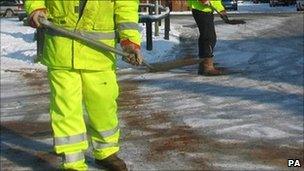Warning over Scotland's public sector jobs
- Published

Economic forecasters said public service jobs would be lost in the next four years
More than 50,000 of Scotland's public service jobs can be expected to go in the next four years, according to a leading economic forecast.
The Item Club of economists has cut back its prediction for the growth prospects of the Scottish economy for this year and 2012.
However, it said that private sector company growth was picking up.
The forecast said about 100,000 jobs should be created in private businesses by 2015.
Dougie Adams, lead author of the Scottish Item Club report, told BBC Scotland that the recovery in the labour market left problems for young people trying to get into work.
He said: "It's a slow, stuttering recovery. While the process is slow, it does leave some people behind."
In its twice-yearly analysis, the Item Club warned that business investment in Scotland could suffer from uncertainty over the nation's constitutional future.
The report foresees a loss of one in eight jobs in the public sector from its peak in 2008 to 2015.
That would mean a cut of 80,000 jobs, to reach 703,000 with a third of that cut already having been achieved.
However, even if roughly 53,000 jobs are yet to be shed, that is expected to maintain Scotland's relatively large public sector workforce. It would remain 10% bigger per head than the UK as a whole.
The forecast - backed by Ernst & Young accountants and using the same forecasting methods as the UK Treasury - said the pick-up in private sector recruitment would be slow for about one more year before accelerating.
Reflecting relatively strong recent job-creation figures, the Item Club said about 100,000 jobs should be created in private businesses by 2015.
Service sector growth
Although parts of manufacturing, particularly in exporting, are doing well, it is not seen as an area for job creation. Companies in that sector could shed 10,000 jobs as they strive to boost productivity and become more competitive.
Instead, private sector job growth is expected to come from the service sector, which is on track to employ more than half the entire Scottish workforce by 2015.
In addition, it is suggested the impact of government cutbacks could be lower than expected, and if so, the rebound in confidence could help the pace of the recovery.

Manufacturing is not seen as an area of job creation, says the Item Club
The ITEM Club said the Scottish economy could be expected to grow by 1.7% this year, down by 0.5% on the forecast it published last winter, with the worsening prospects blamed on inflation and low consumer confidence.
The reckoning is that the Scottish economy will grow by 1.9% next year, down by 0.3% on the previous forecast. The UK forecast, which has recently been cut back, is on track to grow by 2.4% next year.
The economic model does not foresee the Scottish economy returning to the growth rates it enjoyed before the financial crisis and recession, until 2013.
It won't be until the end of 2012 that actual output from the Scottish economy recovers to the same levels it achieved ahead of the recession in 2008.
Corporation tax
The Fraser of Allander Institute at Strathclyde University also downgraded its most recent forecasts.
Publishing its four-monthly forecast in early March, it said the Scottish economy was on track to grow by only 1% this year, down from its previous 1.1% mid-range forecast.
The economists at Strathclyde went on to say that growth in 2012 would be 1.6%, which was a downgrade from their previous 1.9% forecast.
Discussing risks facing the Scottish economy, the Item Club analysis states: "Political developments and the prospect of continuing constitutional change could be an important influence on trends in the Scottish economy in the years ahead."
It says the proposal for the Scottish Parliament to have the power to cut corporation tax rates could take time to implement.
The report added: "While it will take time to introduce any changes - kicking most of the economic consequences well down the road - the debate may add an element of uncertainty to investment decisions in Scotland.
"These are not a consideration in other parts of the UK with the exception for Northern Ireland where similar changes are being contemplated".
- Published15 June 2011
- Published15 June 2011
- Published2 June 2011
- Published15 June 2011